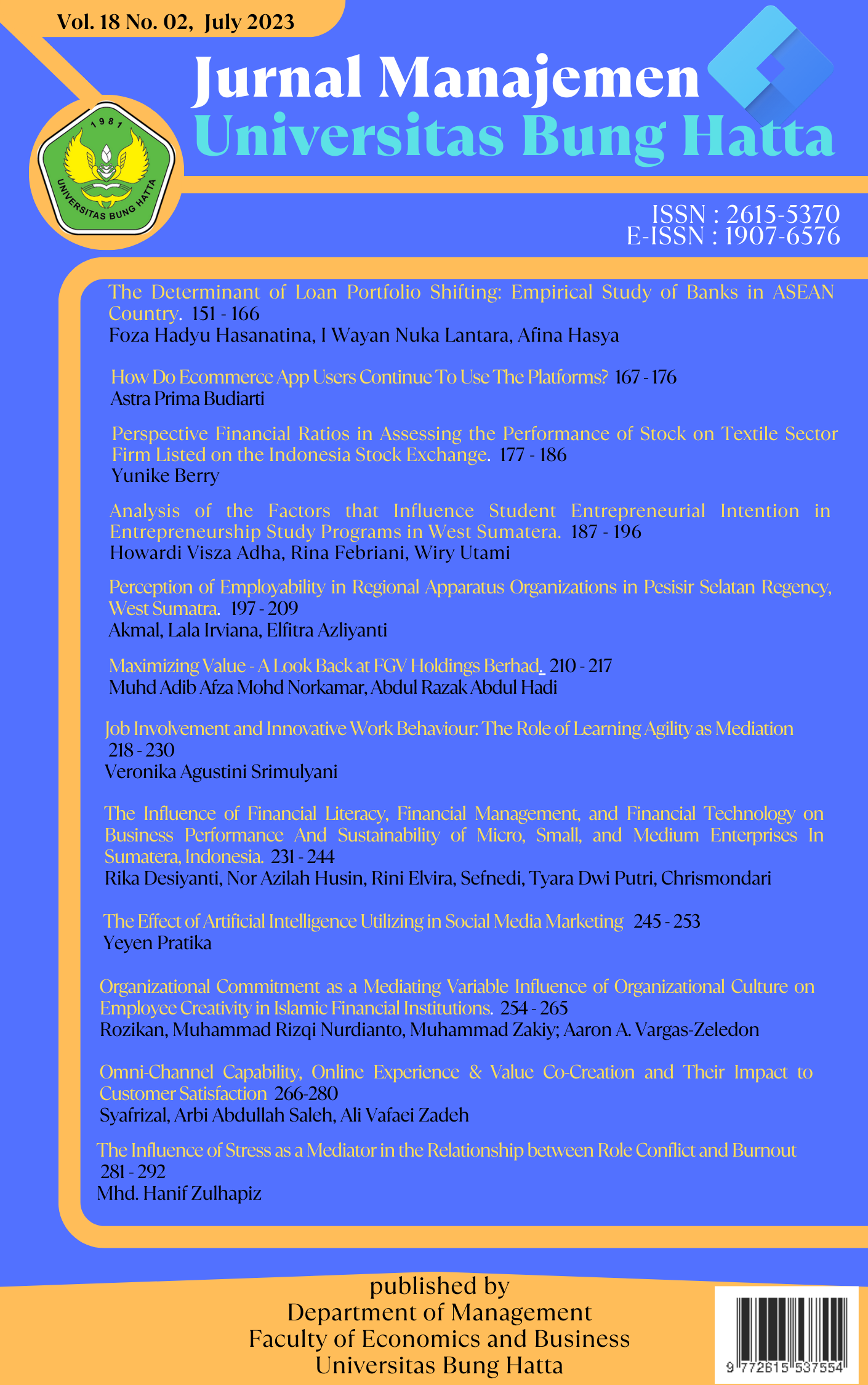Analysis of the Factors that Influence Student Entrepreneurial Intention in Entrepreneurship Study Programs in West Sumatera
DOI:
https://doi.org/10.37301/jmubh.v18i2.23233Abstract
The objective of this study to analysis of the factors that influence student entrepreneurial intention in entrepreneurship study program in West Sumatera.. Total sample in this study is 102 respondents. The method used in this study using survey. The sampling technique used purposive sampling. Respondent in this study were students of entrepreneurship study program in West Sumatera The data processed using SmartPLs 3.0. The result of this study indicate that entrepreneurship education has positive effect on student entrepreneurial intention, curriculum has not effect on student entrepreneurial intention, lecturer competency has positive effect on student entrepreneurial intention and perceived behavioural control has not effect on student entrepreneurial intention.
References
Ahmad, S. Z., Abu Bakar, A. R., & Ahmad, N. (2018). An evaluation of teaching methods of entrepreneurship in hospitality and tourism programs. International Journal of Management Education, 16(1), 14–25. https://doi.org/10.1016/j.ijme.2017.11.002
Allport, G. (1935). Attitute in A Handbook of Social Psychology (In, C Murc). Clark University Press.
Amdam, L. A. (2011). Influence of Socio Cultural Factors on Consumer Buying Behaviour in Borno State. Dissertation, University of Maiduguri.
Barba-Sánchez, V., Mitre-Aranda, M., & Brío-González, J. del. (2022). The entrepreneurial intention of university students: An environmental perspective. European Research on Management and Business Economics, 28(2). https://doi.org/10.1016/j.iedeen.2021.100184
Bignotti, A., & Le Roux, I. (2016). Unravelling the conundrum of entrepreneurial intentions, entrepreneurship education, and entrepreneurial characteristics. Acta Commercii, 16(1). https://doi.org/10.4102/ac.v16i1.352
Fatoki, O. O., & Chindoga, L. (2011). an Investigation Into the Obstacles To Youth Entrepreneurship in South Africa. International Business Research, 4(2). https://doi.org/10.5539/ibr.v4n2p161
Ferreira, J. J., Fernandes, C. I., & Ratten, V. (2017). The Influence of Entrepreneurship Education on Entrepreneurial Intentions. Innovation, Technology and Knowledge Management, 19–34. https://doi.org/10.1007/978-3-319-47949-1_2
Gelaidan, H. M., & Abdullateef, A. O. (2017). Entrepreneurial intentions of business students in Malaysia: The role of self-confidence, educational and relation support. Journal of Small Business and Enterprise Development, 24(1), 54–67. https://doi.org/10.1108/JSBED-06-2016-0078
Iwu, C. G., Opute, P. A., Nchu, R., Eresia-Eke, C., Tengeh, R. K., Jaiyeoba, O., & Aliyu, O. A. (2021). Entrepreneurship education, curriculum and lecturer-competency as antecedents of student entrepreneurial intention. International Journal of Management Education, 19(1). https://doi.org/10.1016/j.ijme.2019.03.007
Neneh, B. N. (2014). An assessment of entrepreneurial intention among university students in Cameroon. Mediterranean Journal of Social Sciences, 5(20), 542–552. https://doi.org/10.5901/mjss.2014.v5n20p542
Nicolaides, A. (2011). Entrepreneurship- the role of Higher Education in South Africa. Educational Research, 2(4), 1043–1050.
Palalić, R., Ramadani, V., Ðilović, A., Dizdarević, A., & Ratten, V. (2017). Entrepreneurial intentions of university students: a case-based study. Journal of Enterprising Communities, 11(3), 393–413. https://doi.org/10.1108/JEC-12-2016-0046
Pickens, J. (2005). Attitude and Perception. In Organizational Bahaviour in Health Care, 43–76.
Prabhu, V. P., McGuire, S. J., Drost, E. A., & Kwong, K. K. (2012). Proactive personality and entrepreneurial intent: Is entrepreneurial self-efficacy a mediator or moderator? International Journal of Entrepreneurial Behaviour and Research, 18(5), 559–586. https://doi.org/10.1108/13552551211253937
Premand, P., Brodmann, S., Almeida, R., Grun, R., & Barouni, M. (2016). Entrepreneurship Education and Entry into Self-Employment Among University Graduates. World Development, 77, 311–327. https://doi.org/10.1016/j.worlddev.2015.08.028
Pulka, B., Rikwentishe, R., Musa Pulka, B., & Aminu, A. A. (2015). The Effects of Entrepreneurship Education on University Students’ Attitude and Entrepreneurial Intention Effects of Small Business on Livelihood of Ownermanager in Taraba State View project The Effects of Entrepreneurship Education on University Students’. European Journal of Business and Management Www.Iiste.Org ISSN, 7(20). https://www.researchgate.net/publication/301355044
Sikalieh, D., Mokaya, S. O., & Namusonge, M. (2012). The concept of entrepreneurship; in pursuit of a universally acceptable definition. International Journal of Arts and Commerce, 1(6), 128–135. http://41.204.183.105/bitstream/handle/11732/289/The Concept of Entrepreneurship in pursuit of a Universally Acceptable Definition.pdf?sequence=1&isAllowed=y
Sugiyono. (2014). Metode Penelitian Bisnis. Alfabeta.
Tessema Gerba, D. (2012). Impact of entrepreneurship education on entrepreneurial intentions of business and engineering students in Ethiopia. African Journal of Economic and Management Studies, 3(2), 258–277. https://doi.org/10.1108/20400701211265036
Wilde, K. (2008). Book Review: International Entrepreneurship Education Issues and Newness. International Journal of Entrepreneurship and Small Business, 5(1), 106. https://doi.org/10.1504/ijesb.2008.015957
Downloads
Published
Issue
Section
License
Copyright (c) 2023 Howardi Visza Adha, Rina Febriani, Wiry Utami

This work is licensed under a Creative Commons Attribution-ShareAlike 4.0 International License.
Authors who publish with Jurnal Manajemen Universitas Bung Hatta agree to the following terms:
- Authors retain copyright and grant the journal right of first publication with the work simultaneously licensed under a Creative Creative Commons Attribution-ShareAlike 4.0 International License that allows others to share the work with an acknowledgement of the work's authorship and initial publication in Jurnal Manajemen Universitas Bung Hatta.
- The author holds the copyright of the submitted and published articles, with the understanding that articles are disseminated under the Creative Commons Attribution-ShareAlike 4.0 International License..
- The editor team is entitled to do the editing in accordance with the guidelines for writing or template in the Jurnal Manajemen Universitas Bung Hatta.
This work is licensed under a Creative Commons Attribution-ShareAlike 4.0 International License.












